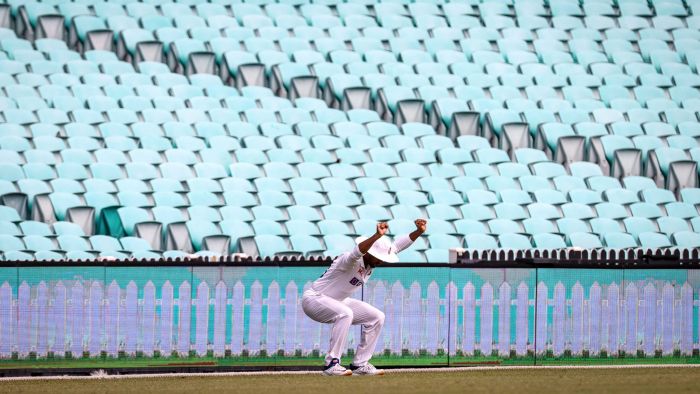Australia’s Chief Medical Officer Paul Kelly has revealed he would not take his elderly relatives to the New Year’s cricket Test in Sydney even though he is happy to see the game go ahead.
Key points:
- Cricket Australia announced the Test would go ahead at the SCG next week, despite quarantine measures required for Queensland players
- The decision was made before the rise in cases today in NSW
- Some experts argue the Test should be cancelled because of the risk of the virus spreading
His comments come as a leading epidemiologist argues the cricket match should be cancelled entirely.
Cricket Australia announced late last night the SCG would host the third Test next Thursday, despite Queensland requiring players to quarantine when they are not training or playing for the final Test in Brisbane later in January.
The decision was made before NSW reported 18 new local COVID cases, including nine that are not linked to the northern beaches cluster.
CMO Paul Kelly said authorities would need to keep a close eye on developments over the next few days.
“I would just reiterate with my family, I wouldn’t be taking them to this particular cricket because of their vulnerability and so there is a risk,” Mr Kelly said.
“It needs to be outweighed with the benefits, of course.
“The other thing I would say is that the start date is January 7, and nine days is very long in COVID time. So let’s see what happens in Sydney in the next week.
“That’s a decision that’s ultimately for the New South Wales authorities. As I said, I’m happy to see the cricket going ahead.”
Just half of the stadium’s seats will be filled, meaning the crowd could be as many as 24,000.
Premier Gladys Berejiklian said masks would be handed out to commuters using public transport on their way to the Test.
“The best health advice to us is that 50 per cent capacity of that venue in an outdoor setting is safer than being in a household in a confined space,” Ms Berejiklian said.
“So outdoor settings, ticketed, seated, controlled events are deemed to be safer than having too many people within a household.”
But epidemiologist Mary-Louise McLaws from UNSW believes spectators could still spread the virus.
“Frankly even though you’re outdoors, you’re outdoors for many hours. There’s a lot of shouting and laughing and joy,” Professor McLaws said.
“There’s potential for super emission.
“It’s good there could be some airflow, even a breeze, but you don’t want to be downstream from that because it could put you at risk.”
While Professor McLaws believes the match should be called off, she said at the very least masks should be mandatory, including on public transport.
“A very blunt instrument that works very well is just cancelling it while we have this uptick in numbers,” she said.
“If you aren’t going to cancel, then masks need to be mandatory all the way from leaving your house … until you get seated.”
The ABC’s Norman Swan, host of RN’s Health Report, argued the State Government needed to go even further.
“The precautionary principle is act fast, act early and beg for forgiveness later because there are no prizes for being late to this party,” Dr Swan said.
“It’s five days after Christmas, one incubation period after Christmas, so you’d expect a spike about now.
“That’s a springboard for New Year’s Eve as well.”
“So the precautionary principle would be locking down Greater Sydney and really holding that for about two weeks.”







